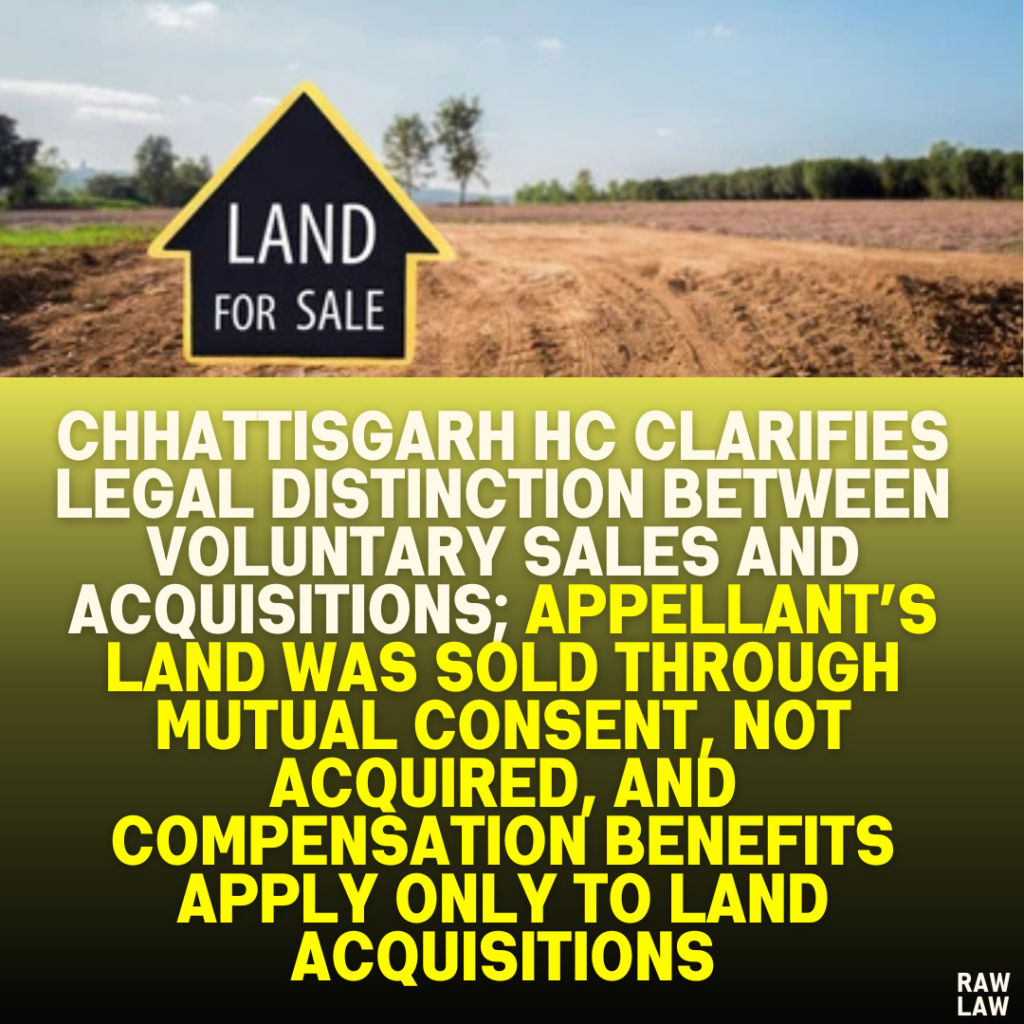Court’s Decision
The Chhattisgarh High Court upheld the decision of the learned Single Judge, dismissing the writ appeal filed by the appellant. The court ruled that the appellant, having voluntarily sold his land through a registered sale deed and accepted the sale consideration, cannot subsequently claim additional compensation under the Model Rehabilitation Policy, 2007, as amended in 2010.
The court noted: “Once the writ petitioner mutually agreed to transfer the land in favor of the respondent by executing a registered sale deed for consideration, the petitioner cannot ask for any further monetary compensation.”
Facts
The appellant, a landless individual, sold his 0.98-acre twice crop-yielding irrigated agricultural land in Village Paraghat to a private corporation (Respondent No. 6) for setting up a steel and power plant. The appellant had no other landholding, making him entirely landless post-sale.
The private corporation required approximately 593 acres of land for the project, with a total investment of ₹3,000 crores. The State of Chhattisgarh had formulated the Model Rehabilitation Policy, 2007, to provide land oustees with compensation and employment benefits. The policy was amended in 2010 to provide compensation ranging from ₹6 lakhs per acre for barren land to ₹10 lakhs per acre for twice crop-yielding irrigated land.
The appellant contended that despite selling his land voluntarily, he was entitled to the enhanced compensation under the amended policy. While he was granted employment under the policy, his claim for additional compensation was denied by the respondents, leading to the dismissal of his initial writ petition.
Issues
- Can a land oustee claim additional compensation under the Model Rehabilitation Policy, 2007, for a land transaction completed through mutual consent?
- Does the policy extend to voluntary land sales, or is it limited to cases of acquisition for industrial projects?
Petitioner’s Arguments
The appellant argued that:
- The Rehabilitation Policy, 2007, was designed to protect and compensate land oustees, even in cases where the land was sold voluntarily for industrial projects.
- A government-issued circular and an environmental clearance condition mandated the respondent company to provide all policy benefits, including enhanced compensation.
- The policy’s benevolent intent should be implemented in its full spirit, providing relief to displaced landowners like himself.
The appellant claimed he was entitled to ₹10 lakhs per acre under the policy’s amended provisions, as his land was twice crop-yielding irrigated agricultural land.
Respondent’s Arguments
The respondents countered that:
- The appellant had voluntarily sold his land via a registered sale deed and accepted the sale consideration mentioned in the agreement.
- The Model Rehabilitation Policy, 2007, applies specifically to cases where land is acquired for industrial projects, not voluntary sales.
- Employment had already been provided to the appellant under the policy, fulfilling their obligations.
They emphasized that the appellant’s claims for additional compensation were unwarranted and lacked legal backing.
Analysis of the Law
The Model Rehabilitation Policy, 2007, was enacted to provide relief to individuals displaced by industrial projects. Its provisions include employment opportunities and a minimum compensation package. Clause 4.1.5 explicitly states that compensation under the policy applies to land acquired for industrial projects.
However, in this case:
- The appellant’s land was not acquired; instead, it was sold through mutual consent.
- The compensation agreed upon in the sale deed represents a contractual settlement, superseding any subsequent claims under the policy.
The court highlighted that the policy does not create enforceable rights in cases of voluntary land sales unless explicitly stated.
Precedent Analysis
The court analyzed the Model Rehabilitation Policy and its judicial interpretation, reaffirming the principle that benefits under such policies apply to cases of acquisition, not voluntary transactions. Prior judgments have upheld the distinction between acquisition and mutual sales, clarifying that legislative policies cannot override mutually agreed contractual terms unless specifically provided.
Court’s Reasoning
The court reasoned that:
- The appellant had voluntarily executed the sale deed, accepting the sale consideration.
- The appellant was provided employment under the policy, fulfilling the respondent company’s obligations.
- The policy’s provisions for enhanced compensation do not apply to voluntary sales unless explicitly stated.
The court concurred with the Single Judge’s findings that the appellant, having agreed to the sale, could not claim additional compensation. The judgment emphasized: “The petitioner cannot ask for any further monetary compensation thereafter, as he agreed to accept the sale consideration.”
Conclusion
The High Court dismissed the appeal, upholding the Single Judge’s order. The court found no irregularities in the decision, stating that the appellant’s claims for additional compensation lacked merit.
The court held: “Once the appellant voluntarily accepted the sale consideration, the claim for further compensation under the Rehabilitation Policy cannot be sustained.”
Implications
The ruling underscores the legal distinction between voluntary sales and acquisitions in rehabilitation policies. It reaffirms that:
- Compensation benefits under policies like the Model Rehabilitation Policy, 2007, are primarily applicable to land acquisitions, not voluntary transactions.
- Parties entering voluntary sales cannot later claim benefits under statutory policies unless such benefits are explicitly extended to such cases.
This judgment provides clarity on the limited applicability of rehabilitation policies to voluntary land sales, protecting industrial stakeholders from unforeseen claims while emphasizing the need for clear legislative intent in policy design.



